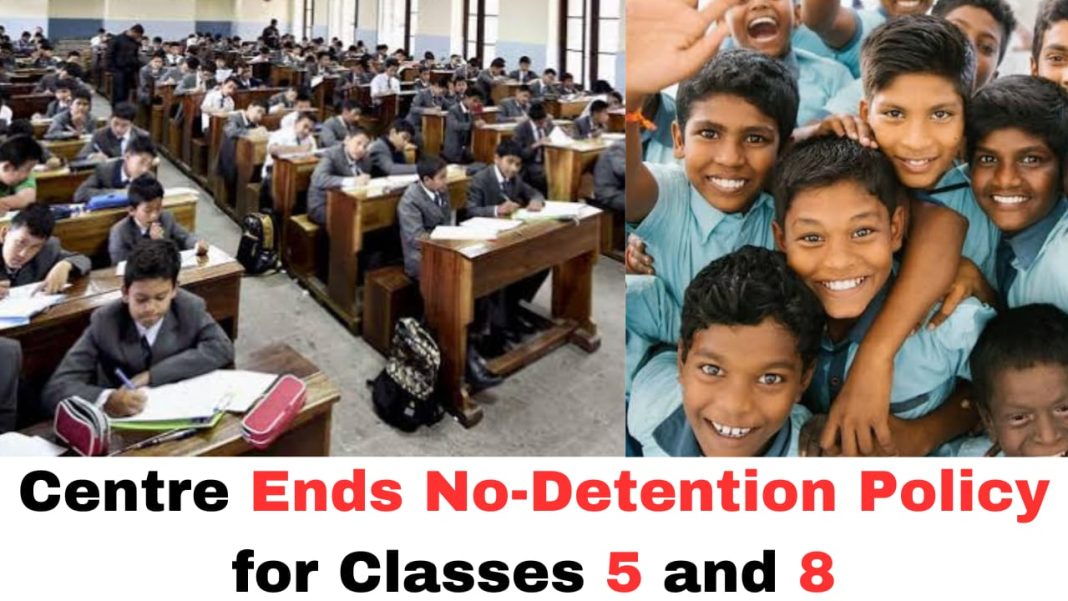Digital News Guru Current Affairs Desk:
The central government has abolished the ‘no-detention policy‘ for students in Classes 5 and 8 in schools under its jurisdiction, including Kendriya Vidyalayas and Jawahar Navodaya Vidyalayas.
This policy change allows these schools to hold back students who do not meet the required academic standards after year-end examinations.

Key Points:
- Policy Change: The ‘no-detention policy’ previously ensured automatic promotion for students up to Class 8, regardless of academic performance. With its removal, students in Classes 5 and 8 who fail to meet promotion criteria may now be detained.
- Implementation: After regular examinations, students who do not fulfill the promotion criteria will receive additional instruction and an opportunity for re-examination within two months. If they fail the re-examination, they may be held back in the same class.
- State Responses: While this change applies to centrally governed schools, states have the discretion to adopt or reject the policy. For instance, Tamil Nadu has announced it will not implement this change and will continue with its current model of automatic promotions for these classes.
Understanding the No-Detention Policy
The no-detention policy, introduced under the Right to Education (RTE) Act of 2009, mandated that no child could be held back or expelled until the completion of elementary education, i.e., up to Class 8. The policy aimed to reduce dropout rates and ensure that all children had access to uninterrupted schooling. Automatic promotion to the next grade was guaranteed, irrespective of a student’s academic performance.
However, over the years, criticism of the policy began to mount. Critics argued that automatic promotion led to a lack of accountability among students and diluted the quality of education. Teachers reported that students were often promoted without achieving the minimum academic standards, leading to significant learning gaps.
The Rationale Behind the Change
The central government’s decision to scrap the no-detention policy for Classes 5 and 8 stems from the need to address these concerns. Education experts and policymakers believe that reinstating detention for underperforming students will encourage better academic performance and accountability.

Under the revised policy, students who fail their year-end examinations in Classes 5 and 8 will be given remedial instruction and the opportunity to reappear for the exams within two months. If they fail the re-examination, they may be held back in the same class.
Scope and Implementation
This policy change is currently applicable only to schools directly governed by the central government, including Kendriya Vidyalayas and Navodaya Vidyalayas. However, state governments have the discretion to adopt or reject the policy in their respective jurisdictions. Notably, Tamil Nadu has already announced that it will not implement this change and will continue with automatic promotions for Classes 5 and 8.
The implementation process will include:
- Regular Assessments: Schools will conduct year-end examinations to evaluate students’ learning outcomes.
- Remedial Support: For students who fail the exams, remedial instruction will be provided to bridge learning gaps before the re-examination.
- Re-examination: A second chance will be given to these students to demonstrate their competency.
Potential Benefits
The decision to reintroduce detention for Classes 5 and 8 is seen as a step towards strengthening academic standards. Key anticipated benefits include:
- Enhanced Accountability: Students and parents will take academics more seriously, knowing that progression is not automatic.
- Improved Learning Outcomes: Holding back students who fail to meet academic standards ensures that they achieve the required competencies before moving to higher grades.
- Teacher Motivation: Teachers may feel more empowered to set higher standards and hold students accountable for their performance.
- Early Intervention: Identifying and addressing learning gaps in elementary education can prevent these issues from escalating in higher grades.
Challenges and Concerns
Despite its potential benefits, the decision has sparked debates and concerns among educators, parents, and child rights activists. Some of the key challenges include:
- Psychological Impact: Detention can have a negative effect on a child’s self-esteem and motivation. Critics argue that it may lead to an increase in dropout rates, particularly among students from disadvantaged backgrounds.
- Resource Constraints: Effective implementation of remedial instruction requires adequate resources, including trained teachers and additional infrastructure, which may not be available in all schools.
- Equity Issues: The policy may disproportionately affect students from marginalized communities who often lack access to quality educational support outside school.
- Implementation Risks: Without proper monitoring, there is a risk that the policy could be misused, leading to arbitrary or unfair detentions.
State Responses
States have been given the autonomy to decide whether to adopt this policy. Tamil Nadu’s refusal to implement the change underscores the diversity in educational priorities across states. The state government has emphasized the importance of holistic development and equitable access to education, arguing that the no-detention policy is crucial for achieving these goals.
Other states are likely to assess the policy’s impact on centrally governed schools before making a decision. This creates a potential for varied educational standards across the country, which could affect overall equity in education.
The Way Forward
The abolition of the no-detention policy for Classes 5 and 8 is undoubtedly a bold move aimed at improving the quality of education. However, its success will depend on how well it is implemented. The government must address potential challenges by:
- Ensuring adequate training for teachers to provide effective remedial instruction.
- Allocating resources to support the additional infrastructure needed for re-examinations and remedial classes.
- Monitoring the policy’s impact to prevent misuse and ensure fairness.
Additionally, it is essential to strike a balance between maintaining academic rigor and supporting the holistic development of students. Providing counseling and support to students who are detained can mitigate the potential psychological impact.
You May Also Read: The Story of the Victoria Memorial: Kolkata’s Iconic Landmark









